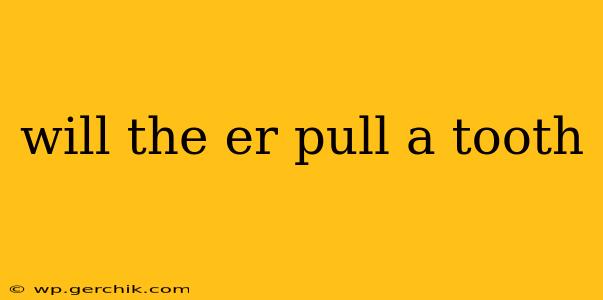Will the ER Pull a Tooth? Understanding Emergency Dental Care
The short answer is: sometimes, but not always. Whether or not an emergency room (ER) will pull a tooth depends on several factors, including the severity of the situation, the resources available at the specific ER, and the attending physician's expertise. While ERs are equipped to handle life-threatening emergencies, they aren't typically the best place for routine or non-emergency dental care.
Let's delve into the specifics:
When an ER Might Pull a Tooth:
- Severe Trauma: If a tooth is severely damaged due to an accident (e.g., a sports injury or car accident), resulting in significant pain, bleeding, or displacement, the ER might extract the tooth as a necessary part of managing the immediate trauma. Their priority is to stabilize the patient and address life-threatening concerns first. This often involves controlling bleeding and managing pain.
- Infection with Severe Complications: In cases of an extremely severe dental infection that has spread beyond the tooth and is causing serious systemic complications (e.g., affecting the jawbone or causing sepsis), the ER might extract the tooth to help prevent further infection and save the patient's life. This is a rare but serious scenario.
- Loose or Partially Erupted Tooth (in Children): In some cases involving young children with a loose or partially erupted tooth causing significant pain or bleeding, an ER might remove the tooth, especially if there's concern about swallowing it.
When an ER Will Likely Not Pull a Tooth:
- Routine Extractions: ERs are not equipped to handle routine tooth extractions. These are best handled by a dentist or oral surgeon in a dental office setting. The proper tools, sterile environment, and expertise are simply not available in the ER for this type of procedure.
- Minor Toothaches or Discomfort: For mild toothaches, pain, or gum discomfort, the ER is not the appropriate place to seek treatment. You should contact your dentist or seek care at a dental clinic.
- Abscesses without Systemic Complications: While a dental abscess is a serious issue, the ER will likely only provide pain management and antibiotics. The actual removal of the abscess and potentially the tooth would be handled by a dentist.
What to Do Instead of Going to the ER for a Toothache:
If you're experiencing a toothache or dental emergency that isn't life-threatening, here's what you should do:
- Contact your dentist immediately: They can assess your situation and provide the appropriate treatment.
- If your dentist is unavailable, call an emergency dental clinic: Many areas have dental clinics specifically for emergency dental care.
- Use over-the-counter pain relievers: Follow the instructions carefully.
What Happens if You Go to the ER with a Tooth Problem?
If you go to the ER for a dental issue, expect to be assessed by a physician. They may provide pain relief, antibiotics for infection, and refer you to a dentist or oral surgeon for more definitive treatment. Be prepared for a long wait and potentially high medical bills, as ER visits are significantly more expensive than routine dental appointments. The ER is designed for medical emergencies, not dental ones.
In Conclusion:
While an ER might extract a tooth under very specific circumstances involving severe trauma or life-threatening complications, it's crucial to understand that this is not their primary function. For non-emergency dental issues, always seek care from a dentist or oral surgeon. Contacting your dentist or an emergency dental clinic is the most efficient and cost-effective solution for most dental problems.
